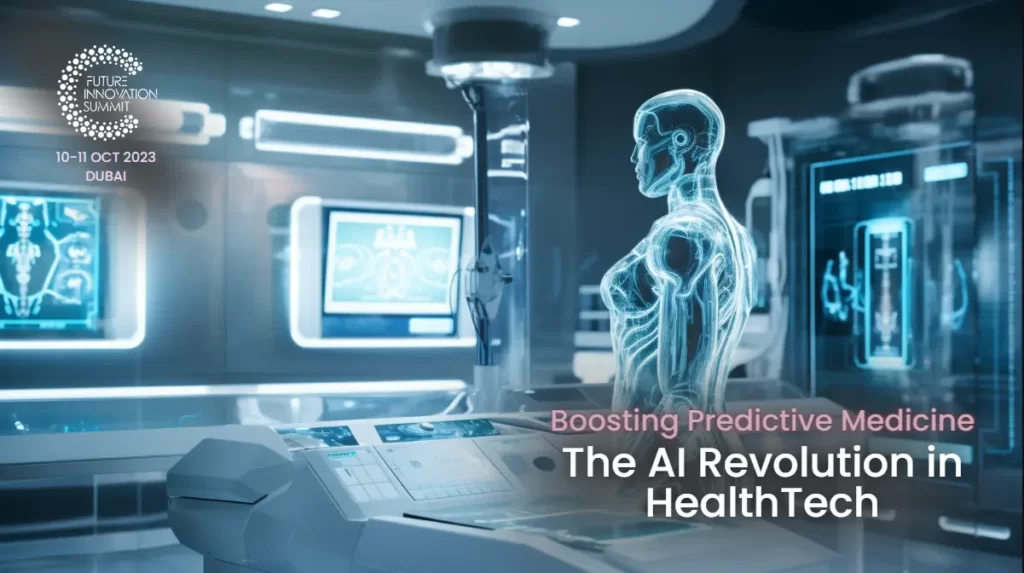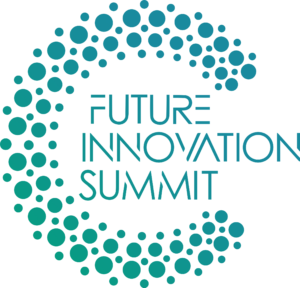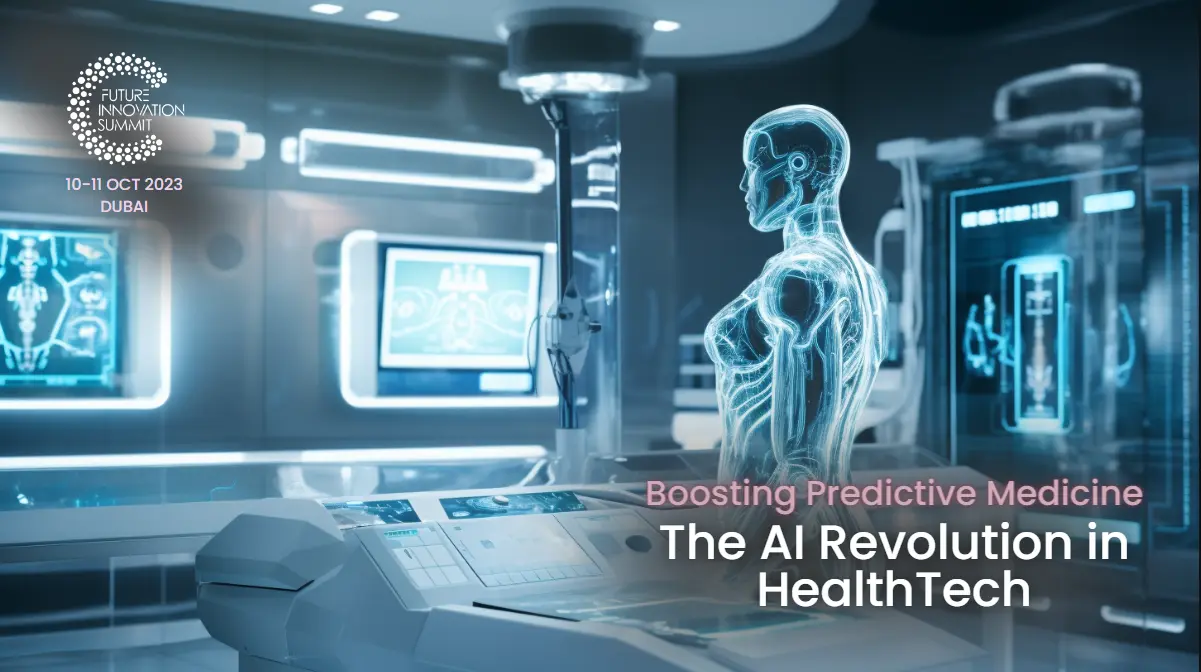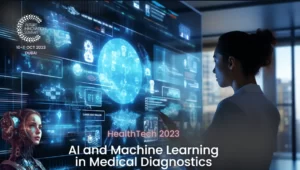Introduction – AI in HealthTech
AI in HealthTech: Healthcare is an industry that has benefited significantly from technological advances, particularly the recent strides in Artificial Intelligence (AI). This article explores how AI revolutionizes HealthTech, focusing on its contribution to predictive medicine.
Understanding Predictive Medicine
Predictive medicine involves using data and algorithms to predict potential health issues before they occur. AI’s capacity to process and analyze large volumes of data is its greatest strength in this sector. But how exactly does AI contribute to predictive medicine?

AI’s Role in Predictive Medicine
- Disease Prediction and Prevention: AI algorithms can analyze patient data, including genetic information and lifestyle habits, to predict disease susceptibility. This early detection allows for preventative measures to be taken, reducing the burden on the patient and the healthcare system.
- Personalized Treatment Plans: AI can help develop tailored treatment plans by analyzing a patient’s health data. This approach often results in more effective treatment, improved patient satisfaction, and reduced costs.
- Improving Diagnosis Accuracy: Machine Learning, a subset of AI, can assist physicians in making accurate diagnoses. AI algorithms can analyze medical images and detect abnormalities the human eye may overlook.
Case Studies – AI in HealthTech
A couple of instances serve as perfect examples of AI in predictive medicine. IBM’s Watson, for instance, has been used in oncology to predict the most effective treatments for cancer patients. Google’s DeepMind, on the other hand, was utilized to predict patient deterioration, allowing for earlier interventions.
Challenges and Future Directions
Despite its promising potential, AI in predictive medicine has challenges. Data privacy concerns, the black-box nature of AI, and the need for clear regulations are some pressing issues. Additionally, there is a need for extensive validation studies to ensure the safety and efficacy of AI systems. Nevertheless, the future of predictive medicine with AI looks promising. Continued research and development, coupled with appropriate regulations, will ensure that AI continues to contribute positively to the HealthTech sector.

The Role of AI and Machine Learning
A critical component of HealthTech’s recent advancements is integrating artificial intelligence (AI) and machine learning. AI can analyze massive amounts of data quickly and with precision, making it ideal for applications in healthcare. AI is instrumental in identifying trends or patterns in large data sets, including patient records and research studies; This can help healthcare providers predict potential health issues in patients, thus allowing for proactive care and improving patient outcomes. Machine learning, a subset of AI, has the potential to revolutionize personalized care. For example, machine learning algorithms can analyze a patient’s genetic information and lifestyle factors to predict their risk of developing certain conditions, such as cardiovascular disease or diabetes. This can allow for early interventions that could prevent the onset of these diseases.
HealthTech and Remote Patient Monitoring
The application of HealthTech in remote patient monitoring (RPM) is another exciting development in this field. RPM refers to using digital technologies to collect medical and health data from individuals in one location and securely transmit that information to healthcare providers in different areas for assessment and recommendations. This technology can include wearable devices that monitor vital signs like heart rate, blood pressure, and blood sugar levels. The data collected can provide healthcare professionals with a more comprehensive view of a patient’s health over time, improve the management of chronic diseases, and reduce the need for hospitalization. RPM also makes healthcare more accessible to those living in rural or underserved areas, where medical resources may be limited. This increased accessibility could significantly improve public health outcomes, especially in the era of a global pandemic where limiting physical contact is necessary.
HealthTech and Improved Patient Experience
HealthTech is also reshaping the patient experience. Digital health records, streamlined booking systems, telemedicine, and patient portals are examples of how technology improves patient experiences. Digital health records allow for efficient and accurate information sharing, reducing the chances of errors and ensuring patients receive the correct treatment. Streamlined booking systems and patient portals allow patients to manage their health more effectively, make convenient appointments, and easily access their medical records. Telemedicine allows patients to consult with their healthcare providers from the comfort of their homes, eliminating the need for travel and reducing wait times. In conclusion, HealthTech is a rapidly evolving field with the potential to revolutionize healthcare. By harnessing the power of technology, healthcare providers can deliver more efficient, effective, and personalized care, ultimately leading to improved health outcomes and a better patient experience.

Ethical Concerns and Future Direction – AI in HealthTech
Despite the evident benefits, adopting HealthTech comes with challenges. Privacy and security of patient data are significant concerns. With healthcare increasingly digitized, the risk of data breaches rises. Regulations like the General Data Protection Regulation (GDPR) in Europe and the Health Insurance Portability and Accountability Act (HIPAA) in the U.S. are in place to protect patient information. However, consistent global standards are required to safeguard patient data, and healthcare organizations must prioritize cybersecurity.
While technology improves accessibility for some, it can also create barriers for others. Not all patients have the digital literacy or resources to leverage HealthTech; This can lead to healthcare access and outcomes disparities. There’s a need for policies ensuring that technological advancements in healthcare don’t leave anyone behind. Looking forward, the continuous evolution of AI, machine learning, and other digital technologies promises an exciting future for HealthTech. These technologies are anticipated to drive advancements in precision medicine, predictive analytics, and genomics. Furthermore, as the Internet of Things (IoT) evolves, the amount of health-related data generated will increase exponentially; This will further improve disease detection, treatment personalization, and health outcome prediction, moving us closer to the goal of predictive, preventive, and personalized medicine. HealthTech presents a world of possibilities for healthcare and has the potential to create a shift in how healthcare is delivered and received. Although challenges need addressing, the future of HealthTech holds great promise for improving global health outcomes.
- Summit topics: AI – Sustainability – EduTech – HelthTech – FinTech
- Visit our LinkedIn page.
- Images are generated by AI.










